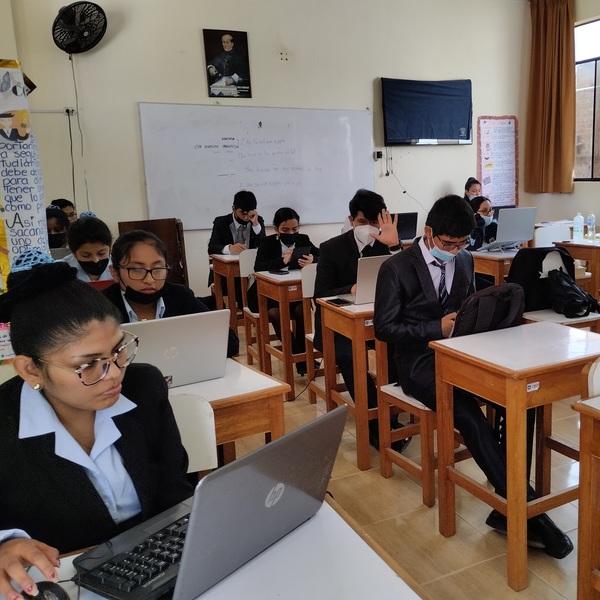Efecto de la gamificación como estrategia para la educación híbrida en estudiantes universitarios
DOI:
https://doi.org/10.37711/desafios.2022.13.2.380Keywords:
game, strategy, teaching, hybrid education, gamifcationAbstract
Objective. Determine the effect of gamifcation as a strategy for hybrid education in university students. Methods. A quantitative approach, pre-experimental design and applied research were used. The sample consisted of 20 students from the professional academic school of Language and Literature of the Universidad Nacional San Luis Gonzaga of Ica. Information was compiled using a survey. A 24-question Likert-type questionnaire was elaborated. In the theoretical basis for the application of hybrid education, the contributions of the Universidad Politécnica of Madrid were considered. Hypothesis inference was made using the Wilcoxon T statistic. Results. A p-value < 0.00 was obtained; therefore, the alternate hypothesis is accepted and the null hypothesis is rejected. Conclusions. The study concludes that the signifcance level is statistically signifcant.
Downloads
References
Espinosa, C. y Gregorio, M. (2018). Gamificación en Educación Infantil [Archivo PDF]. https://core.ac.uk/download/pdf/235851799.pdf
Gené, O. B. (2015). Fundamentos de gamificación [Archivo PDF].http://oa.upm.es/35517/1/fundamentos de la gamificacion_v1_1.pdf
González-Limón, M., Rodríguez-Ramos, A. y Padilla-Carmona, M. T. (2022). La gamificación como estrategia metodológica en universidad. El caso de BugaMAP: percepciones y valoraciones de los estudiantes. Pixel-Bit, 63, 293–324. https://doi.org/10.12795/PIXELBIT.90394
Gamarra Astuhuaman, G., Pujay Cristóbal, O. E. y Ventura Janampa, M. (2020). Aplicación de las pruebas es tadísticas de Wilcoxon y Mann-Whitney con SPSS. Revista De Investigación Multidisciplinaria CTSCAFE, 2(4), 15. http://ctscafe.pe/index.php/ctscafe/article/view/51
Holguin, J., Taxa, F., Flores, R. y Olaya, S. (2019). Proyectos educativos de gamificación por videojuegos: desarrollo del pensamiento numérico y razonamiento escolar en contextos vulnerables. EDMETIC, 9(1), 80–103. https://doi.org/10.21071/EDMETIC.V9I1.12222
Lozada, C. y Betancur, S. (2017). La gamificación en la educación superior: una revisión sistemática. Revista Ingenierías Universidad de Medellín, 16(31), 97–124. https://doi.org/10.22395/RIUM.V16N31A5
Mamani, M. (2022). Aprendizaje en las matemáticas. La gamificación como nueva herramienta pedagógica. Revista Cientifica, 1(5), 53–70. https://doi.org/10.53673/RC.V1I5.25
Martínez, A., Rodriguez, K., Ochomogo, Y. y Miguelena, R. (2019). Gamificación: La enseñanza divertida. El Tecnológico, 28(1), 9-11. https://revistas.utp.ac.pa/index.php/el-tecnologico/article/view/2114
Melo-Solarte, D. S. (2018). El Aprendizaje Afectivo y la Gamificación en Escenarios de Educación Virtual. Inf. tecnol., 29(3), 237-248. http://dx.doi.org/10.4067/S0718-07642018000300237
Perri, R. L., Perrotta, D., Rossani, F. y Pekala, R. J. (2022). Boosting the hypnotic experience. Inhibition of the dorsolateral prefrontal cortex alters hypnotizability and sense of agency. A randomized, double-blind and sham-controlled tDCS study. Behavioural Brain Research, 425, 113833. https://doi.org/10.1016/J.BBR.2022.113833
Prieto, J. M. (2022). Revisión sistemática sobre la evaluación de propuestas de gamificación en siete disciplinas educativas. Teoría de la Educación. Revista Interuniversitaria, 34(1), 189-214.
Santamaría, C. (2017). Textos narrativos y gamificación. Textos de didáctica de la lengua y la literatura, 75, 67-69. http://hdl.handle.net/11162/149313
Solís-Castillo, J. C., Jesús, R. y Lujan, M. (2022). Gamificación como alternativa metodológica en la educación superior. Revista ConCiencia EPG, 7(1), 66–83. https://doi.org/10.32654/CONCIENCIAEPG.7-1.5
Valencia, L. I. y Orellana, D. (2020). Barreras en la implementación de la gamificación en educación superior: revisión de literatura. In Crescendo, 10(4), 571–591. https://doi.org/10.21895/INCRES.2019.V10N4.06

Downloads
Published
Issue
Section
License
Copyright (c) 2022 Julia Liliana Morón Hernández, Guillermo Romani Pillpe, Keila Soledad Macedo Inca

This work is licensed under a Creative Commons Attribution 4.0 International License.
a. Authors retain copyright to their published works, granting the journal the right of first publication.
b. Authors retain their trademark and patent rights, as well as rights to any process or procedure described in the article.
c. Authors retain the right to share, copy, distribute, perform, and publicly communicate the article published in the journal (e.g., by placing it in an institutional repository or publishing it in a book), with acknowledgment of its initial publication in the journal.
d. Authors retain the right to republish their work, to use the article or any part thereof (e.g., in a compilation of their work, conference notes, a thesis, or a book), provided they acknowledge the original source of publication (authors of the work, journal, volume, issue, and date).














